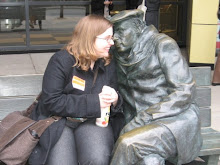You were warned. So if you don't care about books at all, finish this paragraph and you can go back to whatever other sites interest you more. But I just wanted to let everybody know that tomorrow night on the CBC, they are having famous Canadian couples read love letters to each other. Apparently the letters are from the play Love Letters by A.R. Gurney. I just think it will be interesting to see these real life couples reading love letters to each other. You should watch too.
Now, on to the book for the hour, Generation A by Douglas Coupland. I actually finished reading it a few days ago but I needed some time to let it gestate in my brain before I could be able to write about it. First of all, one of the main reasons I love Douglas Coupland is his ability to capture the current zeitgeist. He is like the zeitgeist whisperer. All of his cultural references are current and can't help but bring a smile to your face.
This book is kind of an answer to Generation X (which he popularized as a term) for today. It's about 5 people who are stung by bees after the entire bee population was believed to have died out. Like Gen X, it's basically a book about people telling stories. Now nerds like me will find this extremely interesting. What I liked about the stories is how they all tied into each other even though they were being told by the different characters (like the Channel 3 News Team who keep popping up). The interesting thing though, is that the characters will reflect on the different themes that appear in all their stories or the common threads that keep popping up. So Coupland is really directing you to the themes of their stories which makes me think about how they relate to the larger story that you are in fact reading. I always love his characters because they seem so aware. Sometimes I think I live my life too much like I'm trying to be a Coupland character.
Another interesting point (again, at least to me), is the drug Solon that is described throughout. It pretty much gives you the freedom of not caring about other people at all. Which sounds kinda bizarre but at the same time, appealing in a terrible sort of way. Maybe I'm just a bad person. But the important thing here is that the drug is continually described as the feeling you get when you are reading a novel. Which feeds into the whole tradition of the novel as a reflection and furthering the individualistic culture. But what is Coupland saying here when you are in fact reading a novel? In a way, anybody who reads a novel would almost be guilty as the Solon users since they are intentionally putting up a distance between them and everyone else. Books don't create the same community as television. Even if you are in a book club, you read the books alone.
BUT this novel made me realize why I love Coupland so much. It's because, despite the fact that he is often describing the isolation of the modern culture (an accelerated culture if you will), there is always a community. All the outsiders become a group. In Microserfs and jPOD you have the techy geeks, who though each are often seen as loners, find solace in their own communities. Gen X and Gen A, you have people who feel alienated by their own societies but all the storytellers all come together. And even Eleanor Rigby and All Families are Psychotic, everybody finds their own families and don't quite end up alone. There's an understanding developed by the characters. There will always be an us vs. them but the real goal in life is to find your own us. Above all us, Coupland seems to be fighting for a sense of community, no matter how unusual members of that community might be. And I like that. Gives hope in a time of the modern isolationistic culture. At the end of this novel, the 5 main characters are actually morphing into one entity. How much more communal can you get?
The only part I didn't really care for was the whole "eat your brains at the end." I wasn't going to mention it because it can be a bit of a spoiler but I figure nobody would really read this far.
But I want to leave you with my favourite quote from the novel which is actually on the 2nd page:
"And then what do you do - do you pray? What is prayer but a wish for the events in your life to string together to form a story - something that makes some sense of events you know have meaning.
And so I pray."
Saturday, January 30, 2010
Subscribe to:
Post Comments (Atom)

No comments:
Post a Comment